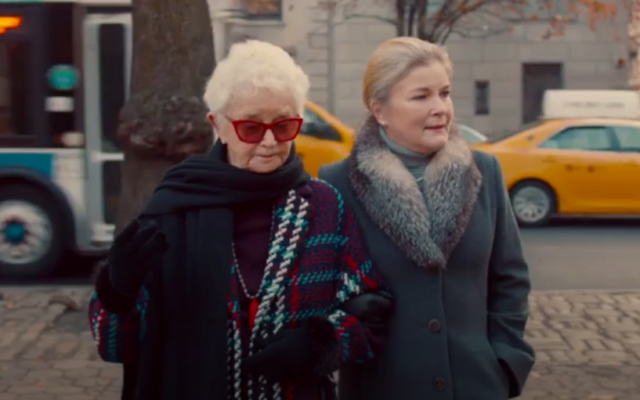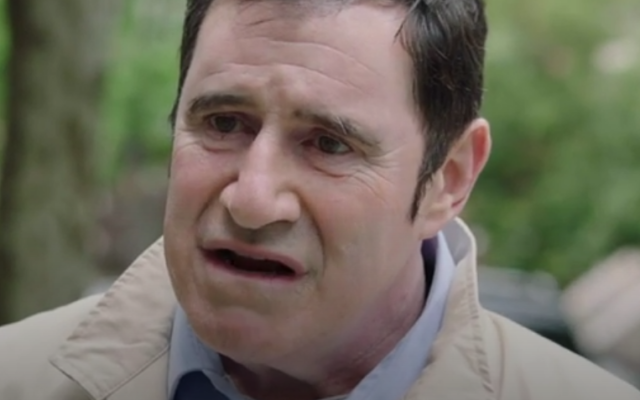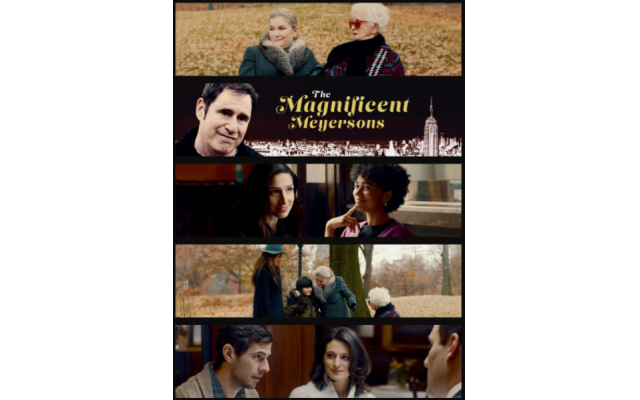‘The Magnificent Meyersons’ Arrives Just in Time
The new film tells the tale of an extraordinary New York mishpocha hiding a toxic family secret.
Watching “The Magnificent Meyersons,” a new film opening in select theaters and available online, is like sitting at a holiday table while exchanging thoughts — high and low — with those you know best.
The story plays out mostly in a series of one-on-one conversations between the members of an accomplished, uncommon Jewish family which, according to the film’s director, Evan Oppenheimer, may be more common than we might initially think.
“They are supposed to be an extraordinary family each in their own way. They’re uncommonly bright, uncommonly philosophical. Maybe I should say for New York Jews, maybe they’re average, I have a very high opinion of New York Jews. But they do seem to have a strong bond that hopefully is evident in the film.”
This story of a New York family held together by a strong maternal figure played by Kate Mulgrew has a loose narrative structure that cloaks a final dramatic secret. The film was shot almost entirely on the streets of New York, not far from director’s home near Union Square and 14th Street in Manhattan. Shooting was completed two years ago, just before the pandemic began and film production became much more difficult.

The natural, almost documentary quality so evident in the production is not accidental, according to Oppenheimer.
“As a lover of dialogue, I tend to accumulate thoughts and themes and characters that pop into my head and I write them down. In a sense, I wanted to put some of the biggest thoughts I’ve had into a dialogue-driven movie that could be made with as small a crew as possible, that I could make without the burden of a big crew.”
While the camera rolls, an occasional police siren can be heard in the background, traffic continues to flow through the streets, and frequently a real pedestrian appears to stroll by.
To bring his imaginary, magnificent family to life, Oppenheimer has assembled a strong ensemble led by the veteran character actor Richard Kind. The performer is a familiar face, having visited Atlanta frequently in recent years to participate in productions filmed here.

Kind may be best remembered for his performance as Uncle Arthur in the 2009 film “A Serious Man,” the Coen brothers’ successful and very loose adaptation of the biblical story of Job, set in Minnesota. That production was also heavy with serious dialogue and challenging family situations that sprang from the fertile imaginations of the producing and directing team of Joel and Ethan Coen.
Kind’s sensitive portrayal of Morty Meyerson, the family patriarch, drives much of the new film’s dramatic tension. But while Kind grew up Jewish on the East Coast, his upbringing wasn’t fundamental to the way he saw his character in “The Magnificent Meyersons.”
“I first and foremost accepted him as a human being. And that’s how I saw this guy who happens to be Jewish. I know it’s probably important to the film that he had that background, but I saw my character as a family man who had problems with himself and could see that the effect that had on his wife and then on his children.”
Kind also sees himself in the psychologically challenged character at the heart of the film.
“I think about how my issues affect my children. You know, I’m a man filled with anxieties. I’m an actor. And I sometimes wonder what effect my neuroses have on my kids.”
The film debuted in outdoor screenings during the third week of August at the large Jewish Community Center on Manhattan’s Upper West Side. Named in honor of Marlene Meyerson — the prominent philanthropist whose $20 million bequest was one of the largest gifts ever given to a JCC in America — the center, coincidentally, is unrelated to anyone in the film.
Whether by design or accident, the film release comes at a time when family ties are once again renewed and strengthened — and challenged — at the start of a new Jewish year.
Oppenheimer, who also wrote and produced the film, likes to think of this as a fortuitous intersection of life and art: “It’s a new year, a good time to reflect upon the past year. It’s a time for looking back and looking forward. And that really is what the movie is about. And really, it’s about memory. It’s about looking at the past, about reevaluating the past. It’s about responsibility for your actions in the past. And it’s about how the past that is always with us and that informs the future. So it really does play into what we as Jews are thinking about this time of year.”




comments